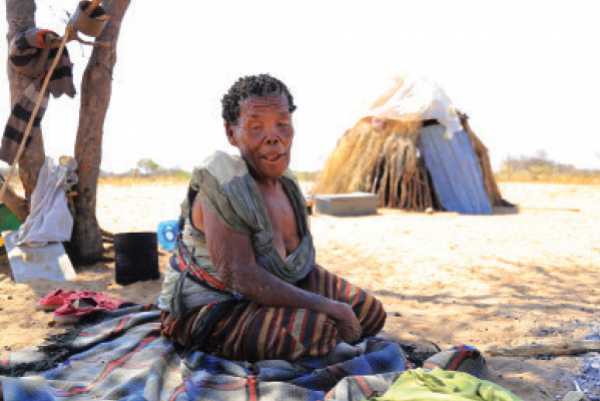Poverty in Botswana stinks to high heavens
Granny Tausu Molotwe from Motokwe in Kweneng West does not see any reason to still be alive. She is very open about her loss of interest in life. “I want to die. It is better to die than to continue living like this,” she says as she points to her small wood-and-grass hut ‘mogwaafatshe,’ which depicts a clear picture of poverty to an observer. Even though her neighbours say she is over 90 years-old, she does not know her age. She is blind and walks bending due to disability. She cannot hear properly. Molotwe has been staying in her shack for the past four years. She shares it with her boyfriend whom she started seeing in 2013.
In all the four recent visits by Botswana Guardian, Molotwe’s boyfriend was never found at home. His girlfriend said he had gone out to look for tobacco. She does not have children. She told BG team that she can go for two weeks without food. She does not have a source of water but depends on her neighbour, who luckily became a beneficiary of President Ian Khama’s housing appeal three years ago. It came with a backyard garden and a jojo water tank. Though she is registered with the Department of Social Services, her cry is that she can go for months without receiving her food basket. Her boyfriend assists with collecting her monthly food rations, ‘depending on his mood.’
‘I live with snakes’
Molotwe’s house is not fit for a human being. Inside, there are old, dirty and rugged blankets and clothes, and empty bags of mealie meal. The has got no normal foundation but is just built on sandy soil. From inside, one can see what is happening outside as there are gaps in between the logs. She says that she sleeps outside as she does not see the benefit of sleeping inside. “When it rains, I shrink inside and just leave everything to God whether I’ll be alive when it stops raining,” she says. She reveals that her boyfriend has on several occasions killed snakes, which tried to bite them.
As she forces a brief, weary smile, the old woman jokes that maybe her death will be caused by snakes, adding that she no longer fears living around them. What keeps her alive, she emphasises, is tobacco. She could not remember the last time she took a bath, as she has no water, soap, or washing basin. “Maybe it was three years ago,” she says, ignorantly. Asked whether she ever goes to the clinic to seek medical help as she kept complaining of pain in her whole body, Molotwe said she does not because of her disability.
A poorer nation
According to a United Nations Development Programme report 2009, the number of people living in poverty in Botswana has slightly decreased from 55 percent of the population to 49 percent. Released on Monday, the Human Development Index (HDI) shows that with a US$13,000 Gross Domestic Product per capita - the highest in Africa - Botswana has managed to reduce the number of people living under US$2 a day from 55 percent to 49 percent of the population as the country continues to fare poorly in human development.
The report, which uses the pre-financial crisis 2007 data, places Botswana at position 125 out of 185 countries in the study; from position 124 out of 177 countries last year. The life expectancy of a Motswana at birth, says the report, is 53 years. On education, 82 percent of Batswana are able to read and write, compared with neighbouring South Africa and Namibia at 88 percent each. In poverty rankings, Botswana is positioned at 81 from 135 developing countries, with factors such as the high probability of a Motswana’s inability to reach the age of 40 slowing the country’s rankings down.Showing the poverty index, there is a 31 percent probability of a Motswana not reaching the age of 40, and 17 percent of Botswana’s adult population above 15 are illiterate. Four percent of the people in Botswana do not use an improved source of water, showing the great lengths to which the government has gone to provide safe and clean water for citizens.
As measured by the Human Poverty Index, 22.9 percent of Botswana’s two million people live below minimum threshold levels in each of the dimensions of the human development index. Botswana is positioned at 81 from 135 developing countries in poverty scores, with factors such as the high probability of a Motswana’s inability to reach the age of 40 dragging the country’s rankings down. The HDI provides a composite measure of three dimensions of human development: living a long and healthy life (measured by life expectancy), being educated (measured by adult literacy and gross enrolment in education) and having a decent standard of living (measured by purchasing power parity, PPP, income).
Rural areas most affected
The first ever Poverty Map produced by the Central Statistics Office uncovered pockets of poverty at district level, according to which Kgalagadi, Ghantsi and Ngamiland have the highest concentrations of severely poor households in Botswana.
The poverty headcount index or the number of poor people expressed as a percentage of the population, shows that the Kgalagadi District is the worst with 19,133 poor people out of a total district population of 41,684. Within the Kgalagadi District, rural Kgalagadi South has a high poverty headcount of 11,570 people out of 19,348 classified as poor.
In short, two out of three residents of rural Kgalagadi South were classified as poor. In rural Ngamiland West, 24,556 out of 44,729 were classified as poor, while in rural Boteti, 16,461 people out of 32,857 were classified as poor.






